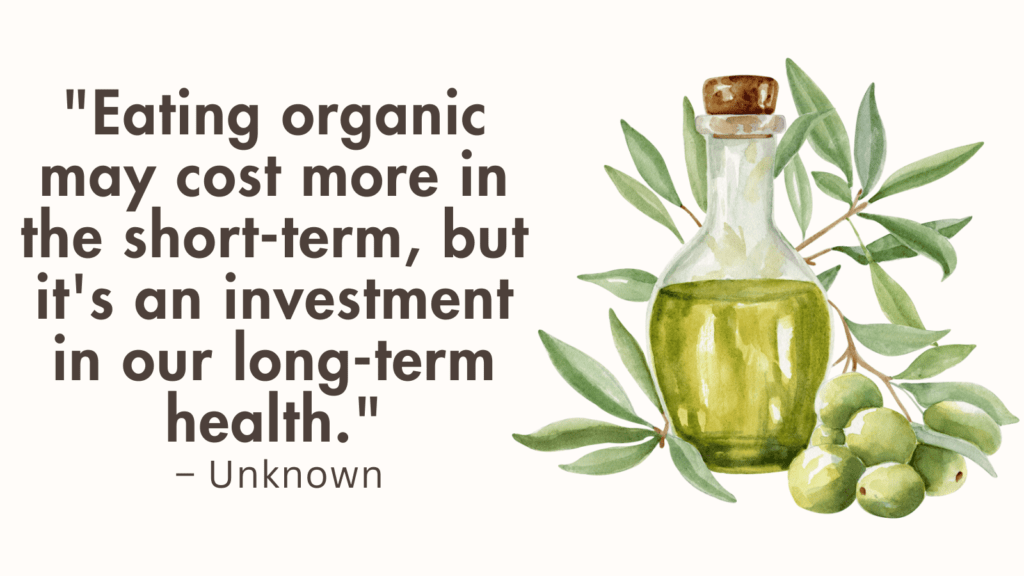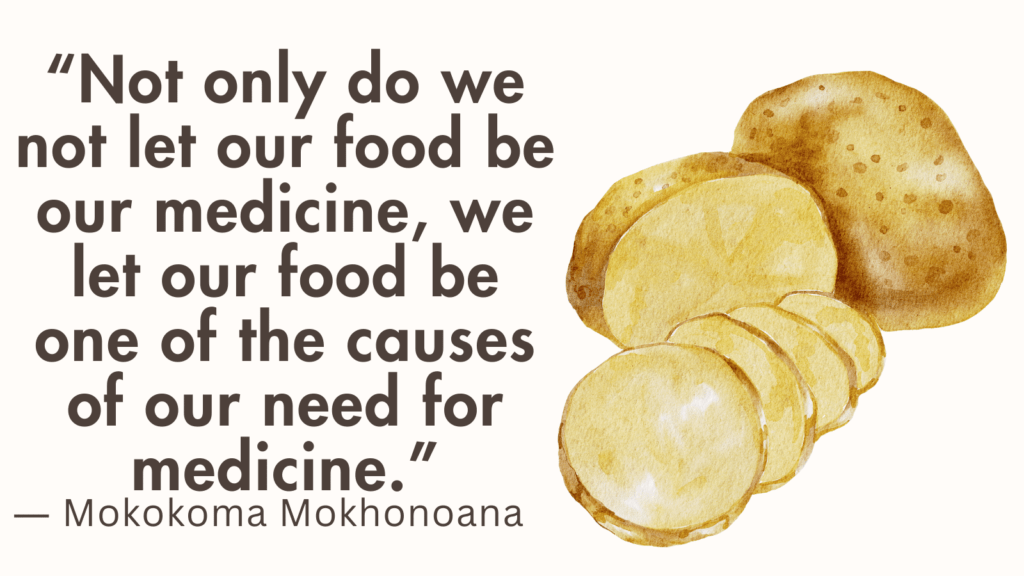In this post, you’ll find out the answer to the question “Does olive oil need to be organic?”
Does Olive Oil Need To Be Organic?
While it is true that organic farming methods have benefits for both the environment and consumer health, determining whether organic olive oil is necessary ultimately depends on personal preferences and priorities.
Organic olive oil is produced from olives that have been grown without the use of synthetic pesticides, fertilizers, or genetically modified organisms (GMOs).
It ensures that the oil is free from potentially harmful residues commonly found in conventionally grown olives.
Additionally, organic farming promotes soil fertility and biodiversity, contributing to a more sustainable agricultural system.
However, it is important to note that conventional olive oil can also be of high quality and undergo rigorous testing to ensure its safety and purity.
Many non-organic olive oil producers follow strict regulations and employ sustainable practices to cultivate their olives.
These oils may still offer health benefits and deliver a delicious taste profile.
When making a decision, consider your personal values and concerns.
If organic certification is a priority and you want to support sustainable farming practices, organic olive oil may be the right choice for you.
On the other hand, if taste and quality are your main considerations, you can find excellent options among both organic and conventional olive oils.
It is also worth noting that organic olive oil tends to come with a higher price tag due to the additional costs associated with meeting organic certification requirements.
Ultimately, the decision to choose organic or non-organic olive oil rests with the consumer.
It is helpful to explore different brands, read labels, and conduct research to ensure you are making an informed choice.
Regardless of whether you choose organic or conventional olive oil, incorporating this heart-healthy oil into your diet can provide numerous health benefits and enhance the flavors of your favorite dishes.
Related: Do Walnuts Need To Be Organic?
Can You Mix Olive Oil and Vegetable Oil?
Yes, you can mix olive oil and vegetable oil together.
In fact, many people do this to create a versatile cooking oil blend.
By combining the flavors and properties of both oils, you can achieve a balanced taste and a higher smoke point.
Olive oil, known for its rich flavor and health benefits, may have a lower smoke point compared to some vegetable oils.
Therefore, mixing it with a high smoke point oil like vegetable oil can help prevent the oil from burning or smoking at high temperatures.
Additionally, blending the two oils can also be a cost-effective option, as olive oil tends to be pricier than vegetable oil.
It’s important to note that the ratio of olive oil to vegetable oil can vary depending on personal preference and intended use.
Some common proportions include 50:50, 75:25, or even 90:10 olive oil to vegetable oil.
Experimenting with different ratios can allow you to find the perfect balance of flavors for your specific recipes.
Related: Do Potatoes Need To Be Organic?
Can I Fry Chicken In Olive Oil?
Certainly! Frying chicken in olive oil is a popular cooking technique that can yield delicious and healthy results.
Olive oil has a relatively low smoke point compared to other oils, around 375°F (190°C), which makes it suitable for light frying or sautéing.
When using olive oil to fry chicken, it’s important to keep the temperature controlled to prevent the oil from burning or smoking excessively.
You can achieve this by using medium heat and monitoring the oil’s temperature with a thermometer.
The natural flavors of olive oil can enhance the taste of your fried chicken, giving it a slight fruity and earthy note.
Additionally, olive oil is rich in monounsaturated fats, which are considered heart-healthy.
However, it’s worth noting that using olive oil for deep frying large amounts of chicken may not be the most cost-effective option, as olive oil can be pricier compared to other oils.
Nevertheless, if you prefer a healthier alternative that adds a unique flavor profile to your fried chicken, using olive oil can be a great choice.
Related: How To Eat Sustainably On A Budget?
Is Olive Oil Keto?
Olive oil is a popular cooking ingredient that has garnered attention for its potential benefits on the ketogenic diet.
The ketogenic diet, commonly known as the keto diet, is a high-fat, low-carb diet that aims to shift the body into a state of ketosis.
Ketosis occurs when the body burns fat for fuel instead of carbohydrates. While olive oil is not exclusively a source of fat, it is predominantly composed of healthy monounsaturated fats.
These fats can be a valuable addition to a keto diet as they are easily digested and provide a steady source of energy.
Additionally, olive oil contains antioxidants, such as vitamin E, which are beneficial for overall health.
It is important to note that while olive oil can be a part of a keto diet, it should still be consumed in moderation.
Excessive intake of any oil, even a healthy one like olive oil, can lead to an excess calorie intake, which may hinder weight loss goals.
So, incorporating olive oil into your meals can be a nutritious and tasty way to enhance your keto journey, but remember to consider your overall calorie intake and balance it with other essential nutrients.
Related: How to Protect Your Watermelon Farm?
How Many Calories Are In Olive Oil?
Olive oil is a popular and versatile cooking ingredient used in a variety of dishes.
When it comes to calorie content, it’s important to note that olive oil is a fat source, which means it contains a higher amount of calories compared to other types of food.
One tablespoon of olive oil contains approximately 120 calories.
However, it’s worth mentioning that the type of olive oil can differ in terms of its calorie content.
Extra virgin olive oil, known for its superior quality and flavor, generally has a slightly lower calorie count compared to pure or regular olive oil.
It’s important to use olive oil in moderation, keeping in mind its caloric value, especially if you’re watching your caloric intake.
Incorporating olive oil into a balanced diet can contribute to a healthy lifestyle, as it contains monounsaturated fats that have been associated with various health benefits, such as reducing the risk of heart disease.
So, while it’s essential to be mindful of calorie intake, using olive oil in moderation can be a nutritious addition to your meals.
Related: Garden Tool Box [Complete Guide + Resources]
Is Olive Oil Low Fodmap?
Olive oil is a popular cooking ingredient that brings a unique flavor and numerous health benefits to our meals.
When it comes to the low FODMAP diet, olive oil is considered to be safe and suitable for those who are following this dietary approach.
FODMAPs are a group of carbohydrates that can cause digestive issues in some individuals, particularly those with irritable bowel syndrome (IBS).
However, olive oil is a fat and does not contain significant amounts of FODMAPs.
This makes it a great choice for those looking to reduce their FODMAP intake.
It can be used in various low FODMAP recipes, such as salad dressings, marinades, and sautés.
Additionally, olive oil is known for its heart-healthy properties, such as being an excellent source of monounsaturated fats and antioxidants.
So not only can you enjoy the delicious taste of olive oil in your low FODMAP dishes, but you can also nourish your body with its many health benefits.
Does Olive Oil Have Gluten?
Olive oil is a popular and versatile ingredient used in many cuisines worldwide.
When it comes to gluten, which is a protein found in wheat, barley, and rye, people with gluten-related disorders or sensitivities often have concerns about its presence in various food products.
The good news is that pure olive oil is inherently gluten-free.
It is derived from the liquid fat of olives through a mechanical process, without any additives or ingredients that contain gluten.
However, cross-contamination during production and packaging processes can occur, so it is essential to look for labels confirming that the olive oil is certified gluten-free or produced in a gluten-free facility if you are extremely sensitive or have celiac disease.
Remember that different brands may have varying practices, so always double-check the labeling or contact the manufacturer for clarity.

Garden Cart
*As an Amazon Associate I earn from qualifying purchases, at zero cost to you, if you click through the link and finalize a purchase.





